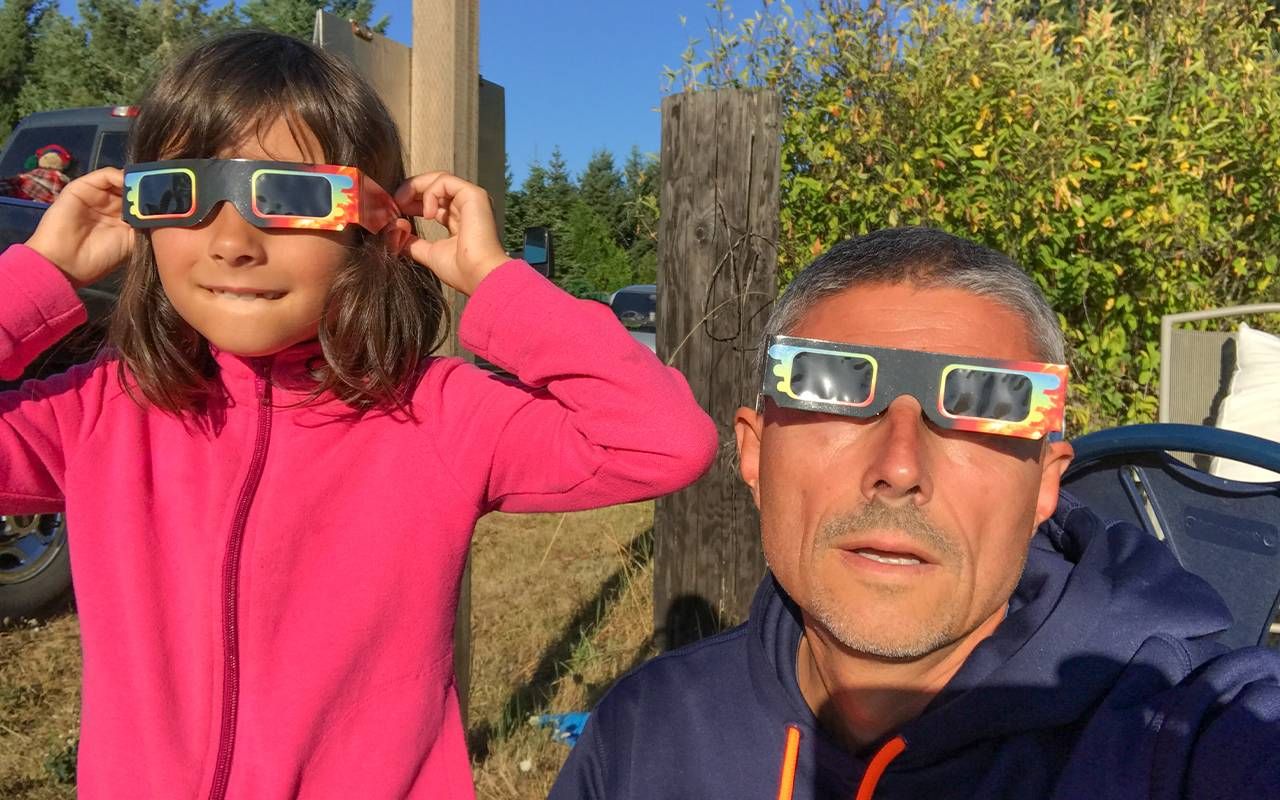Protecting Your Eyes During the North American Solar Eclipse
Even small peeks at sunlight can damage your vision — and it can happen quickly. Here are the precautions you need to take.
On April 8, the solar eclipse's duration of totality will be up to 4 minutes and 28 seconds. According to NASA, about 32 million people through parts of the Midwest into the northeast of the United States will be in the path of totality, where the moon will entirely block the sun. But every state will get to at least see a partial eclipse, except for certain areas of Alaska and Hawaii.

As the excitement builds, it's important to prioritize safety – especially when it comes to your vision.
"It's crucial to protect the eyes during the eclipse," says Lindsay Florkey, OD, an optometrist who owns Greene County Eye Care in Ohio. "As little as one second of exposure looking at the eclipse can create lasting damage to the eyes."
"As little as one second of exposure looking at the eclipse can create lasting damage to the eyes."
In October 2023 some parts of the country experienced a partial, or annular, eclipse. With this type of eclipse, viewers see a "ring of fire" as the moon passes over the sun. But since the moon is further from Earth, it doesn't cover the sun completely, so eye protection would need to be worn through the entire event.
With the April 8th total eclipse, there will be a brief time where you can view the covered sun without eye protection. "The only time that it's completely safe to look directly at the eclipse is if you're in the path of totality, which is only going to last maybe two to four minutes, depending on where you're at," says James Stickel, OD, an optometrist at Goshen Eye Care in Indiana.
Even small peeks at sunlight can damage your vision — and it can happen quickly. As soon as sunlight peeks around the moon, you can't look directly at it without eye protection, says Stickel.
Solar eclipse glasses can help protect your vision, but they're not created equally. The ones to look for need to meet the ISO 12312-2 international standard. These glasses block almost all the sun's harmful radiation and enable you to look directly at the sun.
But ensuring your glasses have that ISO number isn't enough, adds Stickel, thanks to counterfeits being sold on the market. "Make sure you get your glasses from a reputable source." The American Astronomical Society has a list of approved vendors where you can purchase certified eclipse glasses.
After confirming the ISO number, take the additional step of trying on the glasses. "You shouldn't be able to see anything except for the brightest lights, or else it has a chance of being counterfeit," says Stickel. "If you can see anything inside a house, furniture or anything like that, they're not dark enough."
"Make sure you get your glasses from a reputable source."
Inspect the lenses for scratches because this can make the filters less effective and allow unwanted light through that could harm your eyes, explains Stickel. If you need to clean them, stick with a soft cloth and avoid alcohol or any other solvents.
What if you don't have eclipse glasses?
Stickel advises against using homemade household items to view the eclipse, stating that there's nothing you can use to look directly at the sun. But you can create a pinhole projector for indirect viewing of the sun and the American Optometric Association (AOA) has a template you can use. Just don't use them to look at the sun. They're meant to project an image of the eclipse onto the ground, a wall, or a piece of paper behind you.
You can purchase manufactured filters to place over your phone's lens if you want to photograph the eclipse. Viewing the eclipse through your phone screen or camera viewer without a filter won't be damaging to your eye because ultraviolet (UV) light can't travel through your phone.
"But when you're looking at your phone, which is lined up at the eclipse, you're going to be directly or indirectly looking at the eclipse yourself. If you hold up your phone and look up, some part of your peripheral vision will look upward toward that eclipse," says Stickel.
If you don't have a filter to attach to your phone, it's probably not worth the risk to photograph the eclipse.
Viewing the eclipse without eye protection, even for a few seconds, can cause chemical damage in the back of your eye. This might be temporary or permanent, depending on how long you were exposed and how direct the sun's rays are, explains Stickel. Essentially, it's a sunburn on your eye. A burn to the front part of your eye might cause redness and watering. But burns to the back of the eye, in the retina, is known as solar retinopathy.
People who have had cataract surgery should take extra care to avoid looking at the sun without protection.
It can be painless, and you might not notice symptoms right away, says Florkey. "It may take minutes to a few hours, and then you'll notice your vision is blurry." You may also notice changes in your color vision, where colors appear muted, or light sensitivity. Some people might have a headache, but that doesn't happen to everyone, she adds.
More severe symptoms include a loss of central vision, because of damage to the macula, the area in the center of your retina responsible for the vision you rely on most. And this vision loss may or may not come back.
According to Stickel, people who have had cataract surgery should take extra care to avoid looking at the sun without protection. This is because cataract surgery removes your natural lens and replaces it with an artificial one. While the artificial lens has some UV-blocking properties, Stickel says it's often not as effective in blocking UV light as a natural lens would be. This might mean your eyes can easily sustain damage if you view the sun without protection than in someone who hasn't had cataract surgery.
See an eye doctor, known as an optometrist, right away if you notice changes to your vision. If you don't have a regular eye doctor, call your local eye clinic and don't wait.
Even if you don't have symptoms, but you still looked at the eclipse when it wasn't in totality, you should still get an appointment to have your eyes checked, says Florkey. Chemical damage can continue, just as with a sunburn on your skin. "Often, the sunburn is worse in the hours or days afterwards, and that's because of the photochemical damage."
In less severe cases, Stickel says your optometrist might prescribe an anti-inflammatory medication to treat your eyes. "But we don't know how severe that damage is until we take a look at it."
According to Florkey, the key is preventing damage from being done in the first place so there isn't a need for treatment. "The solar eclipse is really an incredible thing to get to view and see. I just want people to be as safe as they possibly can."

Read More

